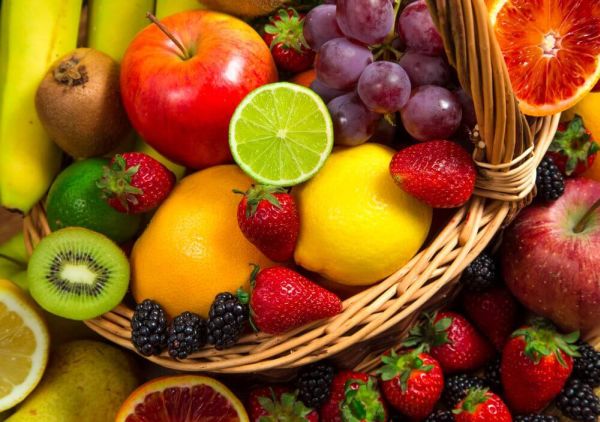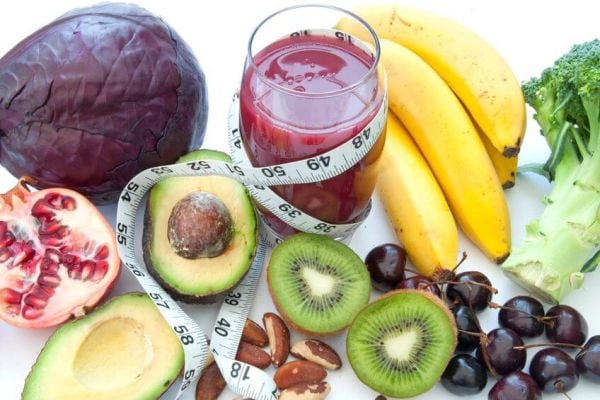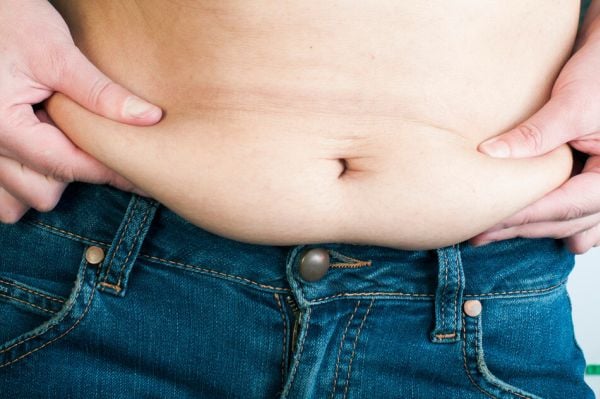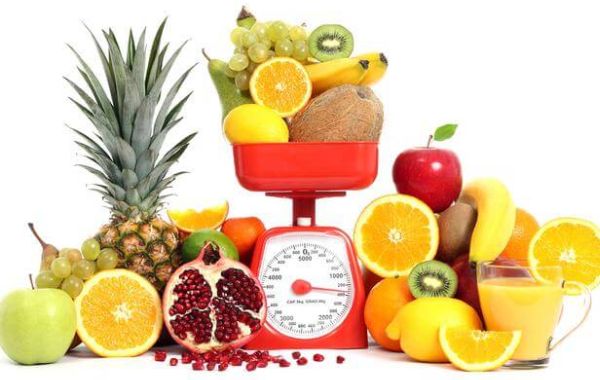Many health gurus claim that fruit can cause horrible things in the body due to the sugar molecule it contains, known as fructose.
I’ve known many people that were thoroughly convinced that they would get fatter if they ate any fruit (many of whom were already overweight, which is ironic), and that couldn’t believe I was able to stay in the single-digit body fat percentages eating over 100 grams of carbohydrate from fruit every day (apples, oranges, and bananas are my favorites).
Some pretty heavy claims have been leveled at fructose in the “pop culture” of nutrition and diet. A popular crusader against it is Dr. Robert H. Lustig, whose talk entitled Sugar: The Bitter Truth currently has over 3.4 million views on YouTube.
According to Lustig and others, fructose has special qualities that directly induce fat storage, and that make it toxic to the liver.
But does the current scientific evidence support these positions? Is fructose, and fruit, bad for our health?
Table of Contents
What is Fructose Anyway, and What’s the Big Deal?

Fructose is a simple carbohydrate that, together with glucose, makes up sucrose (table sugar). It’s found in many plant sources like honey, fruits, flowers, and root vegetables., and is one of the three basic forms of sugar that our body can use as fuel (the other two are glucose and galactose).
Eating an abundance of refined sugars–fructose included–can definitely cause problems beyond just added calories. They have addictive properties normally found with drug abuse, and that can lead to cravings, bingeing, and withdrawal symptoms. Regular consumption of sugar-sweetened beverages is particularly bad, and has been associated with weight gain and obesity, and even an increased risk of cancer in men and women.
But, if we’re to listen to fructose alarmists, this molecule in particular is to be avoided at all costs. For instance, research has indicated that regular consumption of fructose may play a causative role in the epidemic of a cocktail of disease, including hypertension, obesity, metabolic syndrome, diabetes, kidney disease, and cardiovascular disease.
These types of observational studies have led to advices to completely avoid fruit and fructose and assume the less fruit you eat, the better. But there’s more to this story.
The Big Flaw in Fructose Alarmism

When you really dig into the feeding trials that highlight the health problems associated with fructose intake, you quickly notice something.
The dosages of fructose required to produce negative effects are quite high. Not impossible to reach through dietary means, but damn near impossible through fruit alone.
For instance, one study conducted by the University of Lausanne showed that 7 days of a high-fructose diet increased fat deposits in the liver and muscle, as well as fasting triglycerides, and decreased insulin sensitivity. Bad, no doubt.
How exactly what this study conducted, though? Well, they had 16 guys consume a solution consisting of 3.5 grams of fructose per kilogram of weight every day. I weigh about 90 kilograms, so that would mean I would have to eat 315 grams of fructose per day. If I wanted to get that from bananas, I’d have to eat about 45. Or about 80 cups of strawberries. Or 800 cherries. Or 26 apples.
Another study conducted by the University of Fribourg in Switzerland had one group of the 15 volunteers drink a beverage containing 60 grams of fructose, and another a beverage with the same amount of glucose. The result: blood pressure levels were elevated for 2 hours in the fructose group, but not the glucose group.
Well, that’s the fructose found in about 9 bananas, 15 cups of strawberries, 150 cherries, or 5 apples.
Yet another study, this time conducted by the University of California, had participants get 25% of their daily calories from either fructose or glucose. After 12 weeks, both groups gained weight (due to overeating), but the fructose group experienced negative side effects not seen in the glucose group:
- Increased amount of visceral fat.
- Increased fat production in the liver.
- Decreased insulin sensitivity.
- Elevated LDL (bad) cholesterol.
- Increased triglyceride levels.
Pretty nasty indeed. But wait a minute. 25% of daily calories? Well, I eat close to 3,000 calories per day, so that would call for about 175 grams of fructose per day. I won’t bother with the fruit list—you get the idea.
Okay then, so eating large amounts of fructose every day is a bad idea. But, practically speaking, reaching dangerous levels through fruit alone would require deliberate overfeeding. Not only that, but the fiber content of fruit changes how your body deals with the sugars. Fruit also contains various phytochemicals that are good for our health.
Bottom line: consuming 30 grams of fructose from fruit is different than drinking 30 grams of pure fructose, or in the form of high-fructose corn syrup.
Bonus Round:
Does Fructose Magically Turn Into Body Fat and Wreck Your Liver?

One of the common claims against fructose is that, regardless of level of intake, it leads to more weight gain than other sources of carbohydrate. Another is that it’s toxic to the liver, nearly as much as alcohol.
Unfortunately, these positions just aren’t supported by studies done with humans, as opposed to mice and rats (which have very different metabolic characteristics than humans).
Research has shown that a paltry 2-3% of fructose consumed is converted into fat in the liver, whereas 50% ends up as glucose, 25% as lactate, and 15% as glycogen.
It’s not surprising, then, that a McMaster University meta-analysis published in 2012 reviewed 31 fructose feeding trials involving 637 participants, and concluded that “fructose does not seem to cause weight gain when it is substituted for other carbohydrates in diets providing similar calories.”
Some people point to the lactate production as a problem, but these claims were debunked over a decade ago. It turns out that lactate isn’t a metabolic miscreant; in fact, it plays an important role in a number of metabolic processes and is an effective aerobic fuel.
Fructose, like any other form of calories, will cause weight gain when over-eaten, but doesn’t have magical fat storage powers, and it doesn’t damage your liver at low-moderate consumption levels.
So, How Much Fructose Should You Eat Every Day?

According to a meta-analysis of clinical trials evaluating fructose intake, 25-40 grams of fructose per day is totally safe. That’s 3-6 bananas, 6-10 cups of strawberries, 10-15 cherries, or 2-3 apples per day. Or, as the old advice goes, a few servings of fruit every day.
While regular fruit eaters don’t have anything to worry about, but it’s worth noting that regular eaters of refined sugars like high-fructose corn syrup or sucrose can reach unhealthy levels very easily.
For instance, a 20-ounce bottle of soda sweetened with high-fructose corn syrup contains about 35 grams of fructose. One gram of sucrose is about half glucose, half fructose, so if you eat a dessert with 50 grams of sugar, you’re getting about 25 grams of fructose. High-fructose corn syrup is about 55% fructose and found in many processed foods, fruit juices, sports drinks, energy drinks, and so on, so this can add up quickly as well.
Even agave nectar, which is touted as healthy by many due to its low-glycemic properties, can be as high as 90% fructose. Other less processed forms can be as low as 55%.
So, the main takeaway from all of this is you can avoid all the health complications associated with simple sugars like fructose by just keeping your daily intake relatively low. The sources are many, but the effects are the same: agave, sucrose, honey, maple syrup, raw sugar, molasses, brown sugar, high-fructose corn syrup, turbinado sugar, and on and on.
What are your thoughts on fruit and fructose consumption? What are your experiences? Share them in the comments below!
+ Scientific References
- Sánchez-Lozada LG, Le MP, Segal M, Johnson RJ. How safe is fructose for persons with or without diabetes? Am J Clin Nutr. 2008;88(5):1189-1190. doi:10.3945/ajcn.2008.26812
- Gladden LB. Lactate metabolism: A new paradigm for the third millennium. J Physiol. 2004;558(1):5-30. doi:10.1113/jphysiol.2003.058701
- Sievenpiper JL, de Souza RJ, Mirrahimi A, et al. Effect of fructose on body weight in controlled feeding trials: A systematic review and meta-analysis. Ann Intern Med. 2012;156(4):291-304. doi:10.7326/0003-4819-156-4-201202210-00007
- Tappy L, Le KA. Metabolic effects of fructose and the worldwide increase in obesity. Physiol Rev. 2010;90(1):23-46. doi:10.1152/physrev.00019.2009
- Liu RH. Health benefits of fruit and vegetables are from additive and synergistic combinations of phytochemicals. In: American Journal of Clinical Nutrition. Vol 78. ; 2003. doi:10.1093/ajcn/78.3.517s
- Stanhope KL, Schwarz JM, Keim NL, et al. Consuming fructose-sweetened, not glucose-sweetened, beverages increases visceral adiposity and lipids and decreases insulin sensitivity in overweight/obese humans. J Clin Invest. 2009;119(5):1322-1334. doi:10.1172/JCI37385
- Brown CM, Dulloo AG, Yepuri G, Montani JP. Fructose ingestion acutely elevates blood pressure in healthy young humans. Am J Physiol - Regul Integr Comp Physiol. 2008;294(3). doi:10.1152/ajpregu.00680.2007
- Lê KA, Ith M, Kreis R, et al. Fructose overconsumption causes dyslipidemia and ectopic lipid deposition in healthy subjects with and without a family history of type 2 diabetes. Am J Clin Nutr. 2009;89(6):1760-1765. doi:10.3945/ajcn.2008.27336
- Johnson RJ, Segal MS, Sautin Y, et al. Potential role of sugar (fructose) in the epidemic of hypertension, obesity and the metabolic syndrome, diabetes, kidney disease, and cardiovascular disease1-3. Am J Clin Nutr. 2007;86(4):899-906. doi:10.1093/ajcn/86.4.899
- Schernhammer ES, Bertrand KA, Birmann BM, Sampson L, Willett WC, Feskanich D. Consumption of artificial sweetener- and sugar-containing soda and risk of lymphoma and leukemia in men and women. Am J Clin Nutr. 2012;96(6):1419-1428. doi:10.3945/ajcn.111.030833
- Malik VS, Schulze MB, Hu FB. Intake of sugar-sweetened beverages and weight gain: A systematic review. Am J Clin Nutr. 2006;84(2):274-288. doi:10.1093/ajcn/84.2.274
- Avena NM, Rada P, Hoebel BG. Evidence for sugar addiction: Behavioral and neurochemical effects of intermittent, excessive sugar intake. Neurosci Biobehav Rev. 2008;32(1):20-39. doi:10.1016/j.neubiorev.2007.04.019











